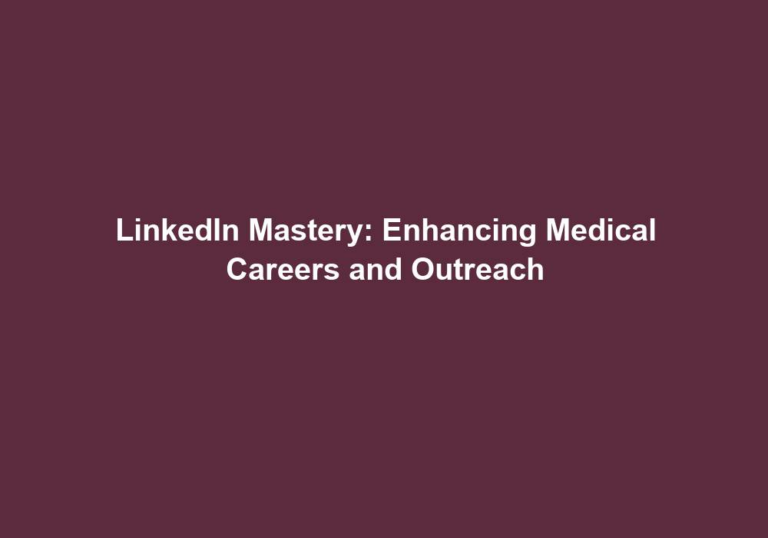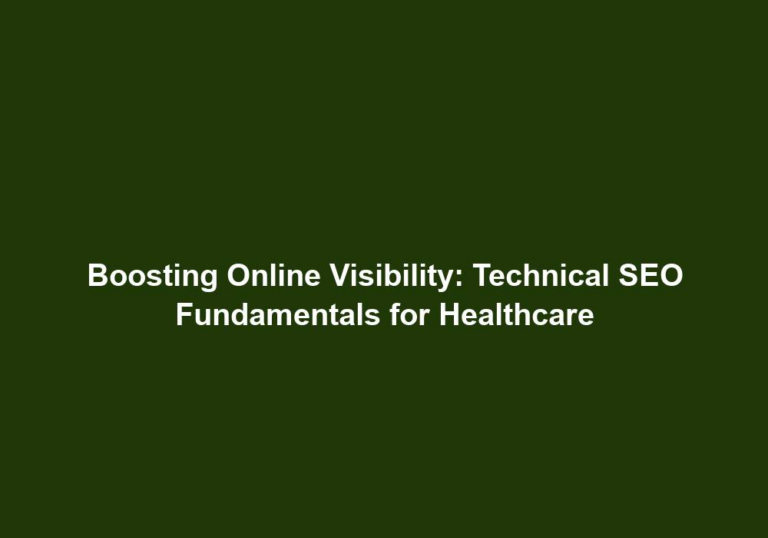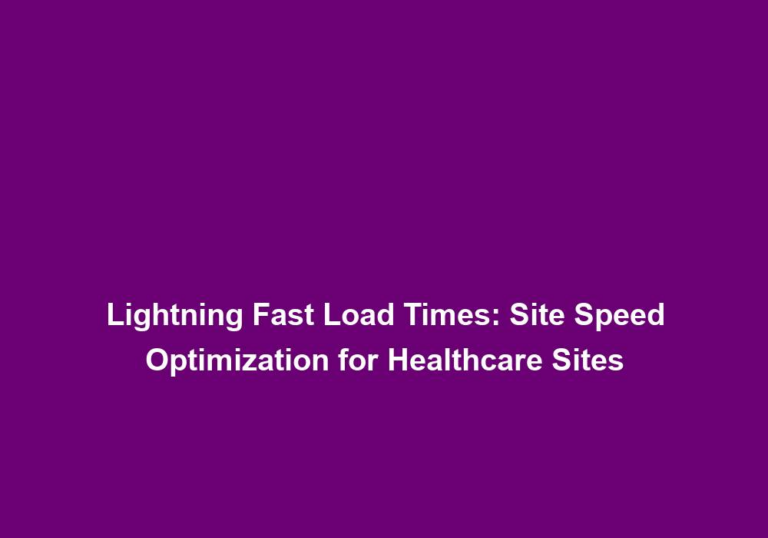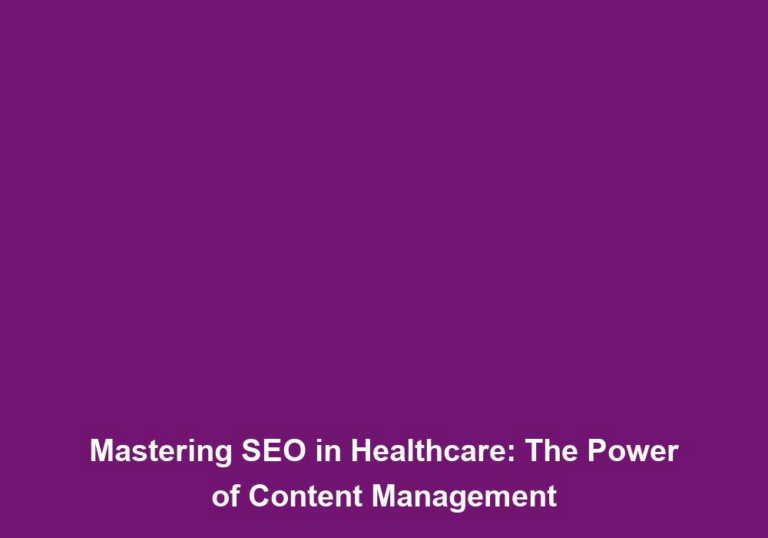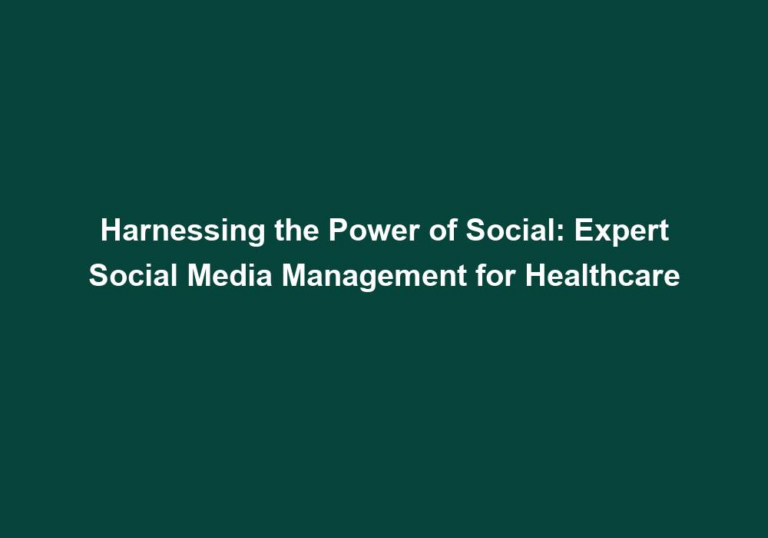Healthcare Digital Marketing Guide: Elevate Your Practice with Online Advertising
In today’s digital world, healthcare providers need to embrace online advertising strategies to effectively reach and engage with their target audience. With the increasing competition in the healthcare industry, it has become crucial for practices to stand out from the crowd and establish a strong online presence. This comprehensive guide will provide you with valuable insights and proven strategies to elevate your practice through healthcare digital marketing.
Benefits of Online Advertising in Healthcare
- Increased Visibility: Online advertising allows healthcare providers to increase their visibility and reach a larger audience. By utilizing platforms such as search engines, social media, and healthcare-specific websites, you can ensure that your practice is easily discoverable by potential patients.
-
Through online advertising, healthcare providers can expand their reach beyond traditional marketing channels and target a wider audience. By leveraging platforms like search engines, social media, and healthcare-specific websites, your practice can gain more visibility and increase its chances of being discovered by potential patients. This increased visibility can ultimately lead to a higher number of patient inquiries and appointments.
-
Utilizing search engine optimization (SEO) techniques in your online advertising efforts can further enhance your visibility. By optimizing your website and content with relevant keywords, you can improve your search engine rankings and appear higher in search results. This can significantly increase the chances of your practice being seen by individuals who are actively searching for healthcare services.
-
In addition to search engine optimization, social media advertising can also contribute to increased visibility. By strategically targeting specific demographics and interests, you can ensure that your practice’s advertisements are seen by individuals who are most likely to be interested in your services. This targeted approach can lead to higher conversion rates and a greater return on investment.
- Targeted Marketing: With online advertising, you have the ability to target specific demographics, locations, and interests. This allows you to focus your efforts on reaching individuals who are most likely to be interested in your services, resulting in higher conversion rates.
-
Online advertising provides healthcare providers with the opportunity to tailor their marketing messages to specific audiences. By utilizing targeting features available on platforms such as social media and search engines, you can ensure that your advertisements are shown to individuals who match your desired patient demographics.
-
For example, if your practice specializes in pediatric care, you can target parents and caregivers in your local area who may be in need of your services. By reaching a more targeted audience, you can increase the chances of attracting individuals who are more likely to convert into patients.
-
Furthermore, online advertising platforms often provide analytics and data tracking capabilities that allow you to measure the effectiveness of your campaigns. By analyzing this data, you can make data-driven decisions to optimize your strategies and further improve your targeting efforts.
- Cost-Effectiveness: Compared to traditional forms of advertising, online advertising often offers a more cost-effective solution. You have the flexibility to set your budget and control your spending, ensuring that you get the most out of your advertising efforts.
-
Traditional forms of advertising, such as print ads or billboards, can be costly and may not provide the same level of targeting capabilities as online advertising. With online advertising, you have the ability to set your budget and allocate your spending based on your specific goals and target audience.
-
For example, if you have a limited budget, you can focus your advertising efforts on platforms that offer cost-effective options, such as social media advertising. By strategically allocating your budget, you can maximize the reach and impact of your campaigns without breaking the bank.
-
Additionally, online advertising platforms often provide insights into the performance of your campaigns, allowing you to track your return on investment. This data-driven approach can help you make informed decisions about where to allocate your advertising budget for maximum effectiveness.
- Measurable Results: Digital advertising provides you with extensive analytics and data tracking capabilities. You can easily monitor the performance of your campaigns, measure the effectiveness of your advertising efforts, and make data-driven decisions to optimize your strategies.
-
One of the key advantages of online advertising is the ability to track and measure the performance of your campaigns. Through analytics and data tracking tools, you can gain valuable insights into the effectiveness of your advertising efforts.
-
For example, you can track metrics such as click-through rates (CTR), conversion rates, and cost per acquisition (CPA) to evaluate the success of your campaigns. This data allows you to identify areas of improvement and make informed decisions to optimize your strategies.
-
By continuously monitoring and analyzing the performance of your campaigns, you can make data-driven decisions to refine your targeting, messaging, and creative elements. This iterative approach can lead to improved campaign performance and a higher return on investment.
Effective Strategies for Healthcare Digital Marketing
1. Search Engine Optimization (SEO)
Optimizing your website for search engines is essential for improving your online visibility and attracting organic traffic. Here are some key SEO practices to implement:
-
Conduct keyword research to identify relevant keywords that potential patients may use when searching for healthcare services.
-
Optimize your website’s meta tags, titles, headings, and content with these keywords to improve your search engine rankings.
-
Create high-quality, informative, and engaging content that addresses the needs and concerns of your target audience.
-
Keyword research is a fundamental step in optimizing your website for search engines. By identifying relevant keywords that potential patients are using to search for healthcare services, you can strategically incorporate them into your website’s content.
-
In addition to incorporating keywords, optimizing your website’s meta tags, titles, headings, and content with these keywords can further improve your search engine rankings. This ensures that search engines understand the relevance and purpose of your website, making it more likely to appear in relevant search results.
-
Creating high-quality content that addresses the needs and concerns of your target audience is also crucial for effective SEO. By providing valuable information and insights, you can establish your expertise and build trust with potential patients. This can lead to increased organic traffic and higher conversion rates.
-
Furthermore, earning backlinks from reputable healthcare websites and directories can increase your website’s authority in the eyes of search engines. This can further improve your search engine rankings and visibility.
2. Pay-Per-Click (PPC) Advertising
PPC advertising allows you to display targeted ads on search engine results pages (SERPs) and other relevant websites. Consider the following tips for successful PPC campaigns:
-
Conduct thorough keyword research and create compelling ad copy that aligns with the search intent of your target audience.
-
Utilize landing pages that are optimized for conversions, with clear calls-to-action and relevant content.
-
Thorough keyword research is essential for successful PPC campaigns. By identifying keywords that are relevant to your target audience and align with their search intent, you can create compelling ad copy that increases the likelihood of clicks and conversions.
-
In addition to compelling ad copy, utilizing landing pages that are optimized for conversions is crucial. These landing pages should have clear calls-to-action and relevant content that aligns with the messaging in your ads. This ensures a seamless user experience and increases the chances of conversion.
-
Continuously monitoring and optimizing your PPC campaigns is also important. By analyzing performance metrics such as click-through rates (CTR) and conversion rates, you can identify areas of improvement and make data-driven decisions to optimize your campaigns for maximum effectiveness.
3. Social Media Marketing
Social media platforms offer immense opportunities for healthcare providers to connect with patients and build brand awareness. Here’s how you can harness the power of social media:
-
Identify the social media platforms that your target audience frequents the most. Focus your efforts on those platforms to maximize your reach.
-
Share valuable and educational content related to healthcare, wellness tips, patient testimonials, and updates about your practice.
-
Identifying the social media platforms that your target audience frequents the most is crucial for effective social media marketing. By focusing your efforts on these platforms, you can maximize your reach and engagement with potential patients.
-
Sharing valuable and educational content related to healthcare can help position your practice as a trusted source of information. This content can include wellness tips, patient testimonials, and updates about your practice. By providing valuable content, you can build trust with your audience and establish yourself as an authority in your field.
-
Engaging with your audience by responding to comments, answering questions, and participating in relevant discussions is also important. This two-way communication can help foster relationships with potential patients and strengthen your online presence.
-
Additionally, utilizing social media advertising features can further amplify the reach of your content. By targeting specific demographics and interests, you can ensure that your content is seen by individuals who are most likely to be interested in your services.
4. Content Marketing
Creating and distributing valuable content is crucial for establishing your expertise and building trust with potential patients. Consider the following content marketing strategies:
-
Develop a blog on your website and regularly publish informative articles, tips, and industry insights.
-
Create educational videos, infographics, and downloadable resources to engage with your audience and provide valuable information.
-
Developing a blog on your website and regularly publishing informative articles, tips, and industry insights can help establish your expertise and attract organic traffic. By providing valuable information, you can position your practice as a trusted source of knowledge and build trust with potential patients.
-
Creating educational videos, infographics, and downloadable resources can further engage with your audience and provide valuable information in a visually appealing format. These types of content can be shared on your website, social media platforms, and other relevant channels to increase their reach and impact.
-
Guest blogging on reputable healthcare websites can also expand your reach and build backlinks to your own website. By contributing valuable content to these websites, you can reach a wider audience and increase your practice’s visibility.
5. Online Reputation Management
Positive online reviews and testimonials play a significant role in attracting new patients. Here are some strategies to manage your online reputation effectively:
-
Encourage satisfied patients to leave reviews on platforms such as Google My Business, Yelp, and Healthgrades.
-
Respond promptly to both positive and negative reviews, demonstrating your commitment to patient satisfaction.
-
Monitor mentions of your practice on social media and address any concerns or inquiries promptly.
-
Encouraging satisfied patients to leave reviews on platforms such as Google My Business, Yelp, and Healthgrades is important for building a positive online reputation. Positive reviews can serve as social proof and influence the decision-making process of potential patients.
-
Responding promptly to both positive and negative reviews is crucial for demonstrating your commitment to patient satisfaction. By addressing any concerns or inquiries, you show that you value patient feedback and are dedicated to providing quality healthcare services.
-
Monitoring mentions of your practice on social media is also important. By actively listening to what patients are saying about your practice, you can address any concerns or inquiries promptly and maintain a positive online reputation.
Conclusion
By leveraging the power of healthcare digital marketing, you can elevate your practice and attract more patients. Implementing effective strategies such as SEO, PPC advertising, social media marketing, content marketing, and online reputation management will help you establish a strong online presence, increase visibility, and ultimately drive more patients to your practice. Embrace the digital revolution and take your healthcare practice to new heights with online advertising.


